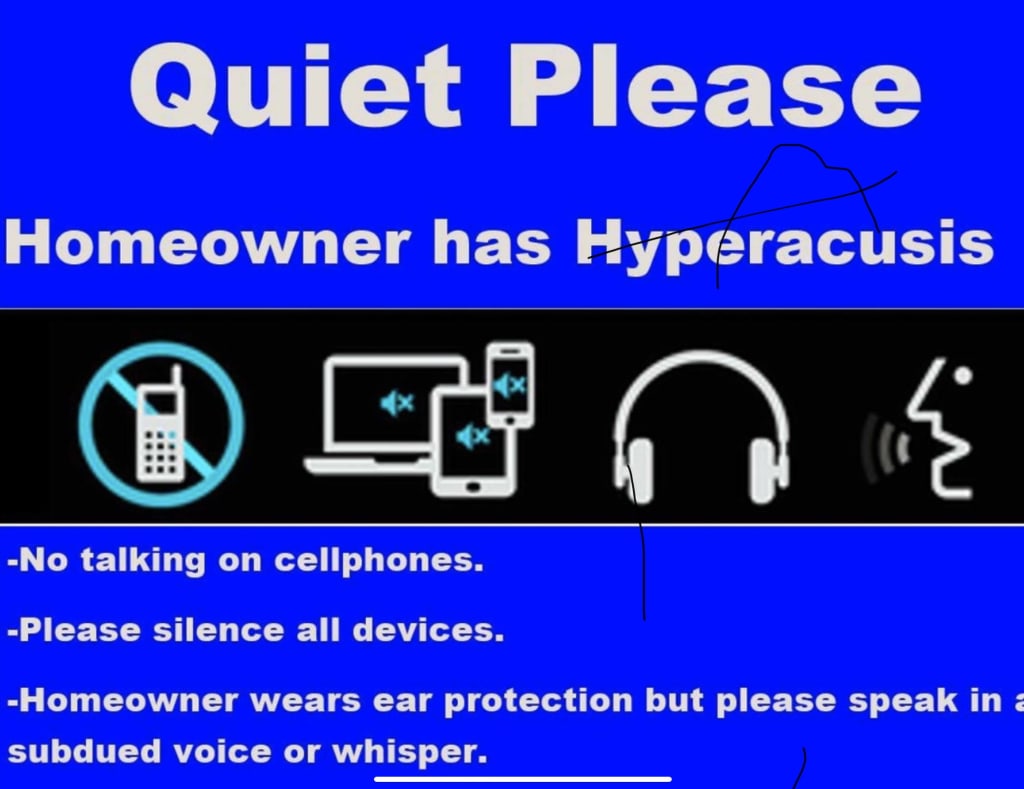How To Help A Familiy Member or Friend With Hyperacusis
Introduction

Oftentimes the level of understanding, accommodatingness, and empathy of family and friends of a person with hyperacusis, can largely impact that amount of physical pain the person is in. This is because family members and friends are often shared in environments or frequently around this person, therefore impacting the noise the person is exposed to. Having hyperacusis in it of itself is already extremely difficult and at times miserable, but having your family doing things that cause you pain constantly and not believing you about your condition can just make the situation unbearable. Sometimes a person’s family are just mean or selfish people, but other times they truly love the person and want to help them, but are misguided as to how. I will assume that any family members and friends of a person with hyperacusis reading this fall into this second category. As a person who has lived with severe hyperacusis for most of my life, here are some things that you can do to help your loved one with hyperacusis.
Get To Know There Noise Tolerance and Needs
Hyperacusis varies in severity from mild to extreme, and the types of frequencies, and tember that are not painful for one person may be very painful for another. If the person is able to communicate, ask them to speak or write to give examples of noises that cause them pain and how they affect their body. Ask the person what you can do to modify the environment and/or your behavior to minimize their pain. In situations where the person is either non-verbal or unable to communicate at that time, pay close attention to their body language. Here are some examples of how a person may act if they are experiencing pain from the noises around them in their environment.
If they are making a face when there is noise
If they are tensing the body
Do they make excuses not to do activities or participate in things that involve noise examples: they never go to parties, or movies
They are often absent from work or school after if the day before was noisy
They where earplugs/ headphones in environments where most people would not
They try to come up with reasons to leave when it gets noisy examples: allows having to use the bathroom when there videos being played, needed to suddenly leave conferences when people start talking loudly
Covering their ears, crying, curling up (more often seen in children)
Seems very quiet or withdrawn
Often seems irritable or moody when there is noise example: when the phones have been ringing a lot at work, or there is construction on the neighborhood
Pauses in there sentences whenever there is sound
Is easily distracted by sound
Has a hard time understanding speech when more than one person is talking at once
Accomadate and Meet There Noise Needs
Hopefully through written, verbal, and nonverbal communication you now have a good understanding of what volumes and frequencies cause the person pain. The next step is to modify the environment and your interactions with them in an attempt to eliminate or greatly reduce exposure to painful noises. If the person is coming over to your house; make sure that any other people in the house are aware, able, and willing to meet that person’s noise needs. This can mean anything from turning off the TV, radio, music, putting all phones on silent, not washing dishes, turning off the washer and dryer, etc. If there hyperacusis is extremely severe it may even mean letting them go in a room in your house far away from the road, or even someplace with no windows or vents such as a closet, attac, or basement. If even with these accommodations your house is still too loud for that person, make sure to speak softly, silence your phone, and not to ring the doorbell when you go over to their house. When considering going out somewhere with this person, go to this place yourself and just stand or sit there and be mindful of the sounds that you hear, before even asking the person if this is an activity that they think they would be able to do. Another part of meeting the person’s noise needs is not only making sure that you are accommodating them, but also being their advocate with other people as well. This can range from explaining about their condition and asking people to quiet down, or advocating for accommodations for them when they are unable to do so; such as being placed in a separate waiting area.
Be Empathetic and Don’t force, encourage, promote sound exposure
In addition to getting to know and meet the persons noise needs to help reduce there pain, it is also important that you don’t make insensitive, though sometimes well meaning comments. First when the person tells you that they are in pain, the noise level or specific noise is painful, remember that you are not in there body. It is very insensitive and emotionally hurtful to person with hyperacausis when you make comments like: its not that loud, your not in that much pain, that sound doesn’t cause you pain, your fine, this is phycological, this is an anxiety problems, I don’t believe that that causes you pain, or anything else to dismiss or discredit what the person is saying about what is happening with there body from the noise. Instead let them know that you believe them about there pain and maybe say something to let the person know that you have empathy for them for example, I can’t imagine what it must be like to get severe pain from everyday noises and have people not even believe me. When you ask or invite your loved one with hyperacusis to do something and they say that they can’t because the noise will be painful for them, don’t try to convince them to go. Instead let them know that you completely understand and care about them so wouldn’t want them to do anything that would cause them pain. Families and friends are also often misguided by doctors that the best treatment for hyperacusis is gradual exposure and to avoid overprotection. Family and friends of a person with hyperacusis need to know several things about this “treatment approach”: there are zero studies of viable size done on patients with pain hyperacusis that demonstrated desentization as an effective treatment, scientist currently do not yet have a working model of the normal human auditory system, although there are people who have improved through desensitization there are also many whose hyperacusis has temporarily or permanently worsened from it, the science behind hyperacusis is just at the emerging edge of research. Keeping all of these things in mind, please do not try to to encourage your loved one to gradually participate in activities involving noise, do sound therapy, or anything else that involves noise that causes them pain.
About the Creator
Jemma Rosewater
I’m a 17 year old writer & advocate for my rare disease, hyperacusis. I love writing poetry, non fiction articles, & short stories on a variety of topics: mermaids, fantasy, emotions experienced throughout human life, sci-fi, fantasy, ect.






Comments
There are no comments for this story
Be the first to respond and start the conversation.